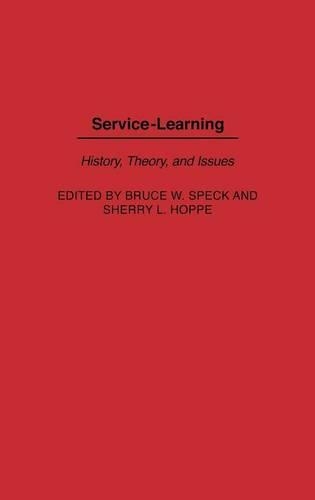
Service-Learning: History, Theory, and Issues
(Hardback)
Publishing Details
Service-Learning: History, Theory, and Issues
By (Author) Bruce W. Speck
Edited by Sherry Hoppe
Bloomsbury Publishing PLC
Praeger Publishers Inc
30th July 2004
United States
Classifications
General
Non Fiction
370.115
Physical Properties
Hardback
224
Description
Although service-learning programs can have diverse theoretical roots, faculty who engage their students in service-learning may not be be cognizant of alternatives to the one they adopt. This book presents not only a historical perspective, but it also debates the theories and issues surrounding the conflicts inherent in those theories. One theory, based on a philanthropic model, engages students in a commitment to serve others from a sense of gratitude for their own good fortunes or from a desire to give back to communities from which they have benefited. Typically, service-learning programs based on the philanthropic or communitarian models deal with the overt needs of community members. In contrast, the civic model requires deeper analysis of the various political and social issues that may be the cause of social conditions that require the help of the more fortunate. Opponents of the civic theory fear that proponents see the classroom as a forum for advancing particular political agendas, conceivably indoctrinating students to a particular view of social injustices. This book presents the theories and critiques their merits and liabilities, providing insight into the widely divergent curricular applications. It also examines the reasons professors should consider service-learning components in their classes and provides resources for further investigation of both theory and practice.
Reviews
In recent years service-learning has been linked with classroom theory and students' participation in some sort of outside-the-classroom activity in their community. Speck and Hoppe have divided their book into three parts, each of which is supported by essays written by researchers interested in that aspect of service-learning....Speck's unannotated bibliography of selected service-learning sources for readers who wish to gain additional background information on service-learning should be a useful resource. Highly recommended. All levels.-Choice
"In recent years service-learning has been linked with classroom theory and students' participation in some sort of outside-the-classroom activity in their community. Speck and Hoppe have divided their book into three parts, each of which is supported by essays written by researchers interested in that aspect of service-learning....Speck's unannotated bibliography of selected service-learning sources for readers who wish to gain additional background information on service-learning should be a useful resource. Highly recommended. All levels."-Choice
Author Bio
BRUCE W. SPECK is the Vice President for Academic Affairs and Professor of English at Austin Peay State University. SHERRY L. HOPPE is the President of Austin Peay State University.
